|
Sharps.
Just the name recalls not only the rifle and its maker, but
brings to mind images of times long past. Images of professional
hunters whose lives and livelihoods depended upon the power and
accuracy of their rifles. Images of the great bison herds that
once covered the plains of the Western United States. Images of
hunters and skinners setting around the evening fire planning
the next dayís work, with hides piled high in the background,
as the hunters cast bullets from lead melted over the campfire,
and loaded them into huge brass cartridge cases stuffed full of
black powder. Although other rifles were used during the years
of the bison slaughter, the Sharps is the one most identified
with the period. Modern day shooters who love the old Sharps are
not merely enjoying a great old rifle, but are connected by the
gun to a time when life was a bit less hectic, a bit more
dangerous, and guns were made of metal and wood.
The Sharps
rifle gained its popularity in the nineteenth century due to its
durability, accuracy, simplicity, and power. The cartridges for
which the Sharps were chambered could reliably kill the largest
animals on Earth.
Today, the
choices available in a good Sharps replica are many. The
original Sharps company is long gone, but several manufacturers
now offer rifles that are even better than the originals. Some
of these modern rifles are very expensive custom guns, costing
thousands of dollars are requiring a very long wait. As with
many rifles of the nineteenth century, quality replicas are
manufactured in Italy and Spain. One of the best Italian Sharps
builders is Davide Pedersoli, and one of the best
importers is Cimarron Firearms in Fredericksburg, Texas.
The subject gun of this article is built by Pedersoli, and sold
by Cimarron. Cimarron is very serious about authenticity in its
replica firearms, paying close attention to every detail.
Cimarron offers several variations of the Sharps, with the model
sent to me for testing being the "Billy Dixon",
chambered for the .45-90 cartridge.
Billy Dixon,
for those who havenít heard the story, was among other
things in his life, a buffalo hunter during the heyday of the
hide hunting business. It is said that he could keep ten hide
skinners employed just to keep up with him. In addition to
hunting, he was also well known as a target shooter. While later
working for the Army as a civilian scout, he would be awarded
the Congressional Medal of Honor
for his heroics at the battle of Buffalo Wallow, but the event
that propelled him to fame happened at the second battle of
Adobe Walls. Adobe Walls was the remains of an old Spanish
mission, that had been occupied for the purpose of supplying the
hide hunters in the Texas panhandle. The day of June 27, 1874
found Billy Dixon, 26 other men, and one woman fighting for
their lives against a party of Kiowa and Comanche warriors, the
number of which is reported to be between 250 and 500 strong,
depending upon the account. As the war party was forming for an
attack on the people holed up at Adobe Walls, Billy Dixon took a
shot at a mounted Kiowa warrior, knocking him off of his horse
at a distance that was later confirmed by a surveyor to be 1538
yards, or a full nine-tenths of a mile! Billy never attributed
the feat to anything but good luck, but it saved him and his
associates from certain death at the hands of the war party. The
Indians were so surprised at the power and accuracy of the white
manís rifles that they retreated.
[Ed. Note:
the June 2003 issue of the NRA's magazine America's
1st Freedom features an article on Billy Dixon's
remarkable shot. Entitled "Gun Smoke Over Adobe
Walls", the excellent article was written by Gary Lantz.
- Boge Quinn]
This Cimarron
Sharps is named in honor of Billy Dixon, and is set up right for
long range shooting. Some shooters, who are accustomed to the
latest and greatest Ultra Flat-Shooting Gee-Whiz Magnum,
canít see cartridges such as the .45-90 as a long range
weapon. It does have a rather curvaceous trajectory, but in the
hands of a capable marksman can do rather well out to about 1100
yards, and beyond. The Cimarron has both a medium
range ladder rear sight, and long range tang-mounted aperture
sight. The front sight is a thin blade mounted atop the heavy
octagon barrel, which measures a full thirty-two inches in
length and .885 of an inch across the flats at the muzzle.
The Billy
Dixon Sharps is a very good-looking rifle, exhibiting better
than average fit and finish, with well-executed case hardening
and beautiful bluing. The walnut stock is checkered on the wrist
and forearm. The double set trigger released with a pull of just
under seven pounds in the normal mode, and just over one pound
in the set mode, and is adjustable for weight-of-pull.
As I assembled
the necessary components and accessories for shooting the
Cimarron Sharps, I found that while .45-90 components are not
really hard to find, they are also not available at every local
gun store. A call to Starline Brass
soon had some of their top-quality .45-90 cases on the way.
These cases are made just like Starlineís other brass from new
materials, and not reformed from another case. I have
found that Starline makes some of the best brass on the planet,
and can supply cases that are considered obsolete by other
manufacturers. I already had on hand jacketed bullets from Remington
that I keep to feed my .45-70 rifles, and I also ordered some of
the superb cast bullets from the fine folks at Mount Baldy
Bullets in Cody, Wyoming for some long range target
shooting. These bullets are made from the best alloys available
to ensure proper obturation, accuracy, and expansion.
As you will
notice in the photos, I also made use of a beautiful cartridge
belt that is a new item from San Pedro Saddlery called
their "Quigley" model, in deference to the belt
worn by Tom Selleckís character in the movie
"Quigley Down Under". This San Pedro belt is the best
execution of its type that I have ever seen, and is the perfect
way to carry extra cartridges for the big Sharps. It is built of
fine quality leather, and exhibits superb craftsmanship.
Testing was
done using a variety of powders, including Accurate 5744, Hodgdon
322, Clean Shot, Hodgdon Pyrodex and Triple-Seven, and good olí
FFg black powder.
With any of the various loads tried, the Cimarron Sharps is just
plain fun! The smokeless powder loads were accurate and
powerful, but the black powder and replica black loads were just
as accurate, and added a bit more authenticity to the procedure,
producing a thick cloud of smoke upon firing. From a bench rest
at 110 yards, the Cimarron would place three of the Mt. Baldy
480s into a nice little cloverleaf, when I did my part. That is
very good accuracy, proving that the old style guns can shoot
along with the best modern rifles, all while using the original
style iron sights. I was pleasantly surprised. The other Mt.
Baldy bullets, as well as the jacketed bullets, also exhibited
great accuracy, but the Mt. Baldy cast bullets seemed more at
home in the Sharps. I was unable to try the Cimarron Sharps at
longer ranges, but intend to take the gun out West and give it a
try at a few hundred yards, after adding a globe front sight.
I believe that
the combination of the Cimarron Billy Dixon Sharps, the great
Mt. Baldy bullets, and that beautiful San Pedro belt will make
for some fun and interesting shooting in the desert Southwest. I
have no hopes of hitting a man-sized target at almost a mile as
Mr. Dixon did, but I do intend to have fun trying.
For those
shooters who long to own a piece of history, and a fine Sharps
replica, you canít go wrong with this rifle from Cimarron. It
is available in several other variations and calibers, in
addition to the .45-90.
For more
information on the complete line of fine quality replica sixguns
and rifles from Cimarron, check them out online at: www.cimarron-firearms.com.
Check out
Starlineís catalog of cartridge cases online at: www.starlinebrass.com.
The extensive
line of San Pedro leather goods can be viewed at: www.sanpedrosaddlery.com.
For a look at
the full line of Mt. Baldy Bullets, go to: www.mtbaldybullets.com
Jeff Quinn
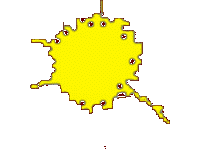  
Got something to say about this article? Want to agree (or
disagree) with it? Click the following link to go to the GUNBlast Feedback Page.
|
|
Click pictures for a larger version.
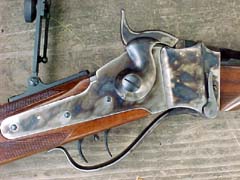
Cimarron's 1874 Sharps "Billy Dixon" rifle is
a superbly-crafted reproduction of the legendary Sharps.
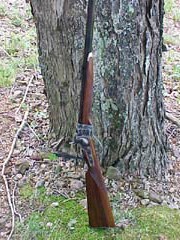
Beautiful in every way, the Cimarron "Billy
Dixon" Sharps shoots as good as it looks!
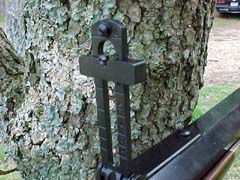
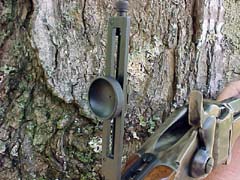
The "Billy Dixon" Sharps comes with two rear
sights: a barrel-mounted mid-range sight (top) and a
tang-mounted long-range sight (bottom).
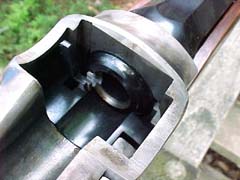

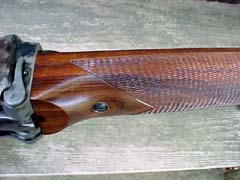
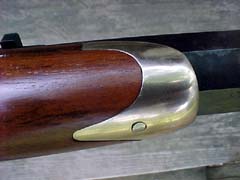
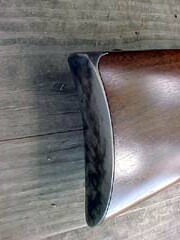
The "Billy Dixon" Sharps is an authentic item,
from the octagonal barrel to the steel butt-plate. Fit and
finish of all wood and metal parts is consistently excellent,
along the lines of what you'd expect on a rifle costing
thousands of dollars more. Cimarron's legendary attention to
detail has never been more apparent.
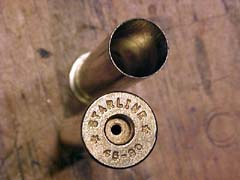
Starline Brass offers great-quality newly-made cases for
the big .45-90.
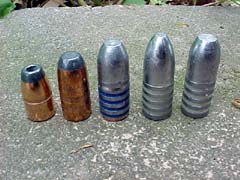
Bullets tested included (left to right): Remington
300-grain JHP; Remington 405-grain JSP; 460-grain, 480-grain,
& 500-grain cast lead bullets from Mt. Baldy Bullets. The
jacketed bullets performed superbly in the .45-90, but the big
Sharps seemed most at-home with the big lead bullets.
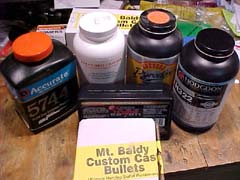
An assortment of components used in testing the Cimarron
"Billy Dixon" Sharps. The rifle performed superbly
with all loads tried.
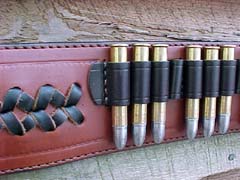
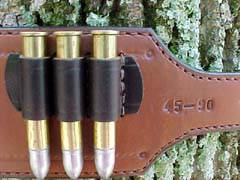
The perfect accessory for the modern-day "buffalo
hunter" is San Pedro Saddlery's brand-new
"Quigley" model cartridge belt. Named for Tom
Selleck's famous character in the movie "Quigley Down
Under", this belt is beautifully-made, rugged and
practical.
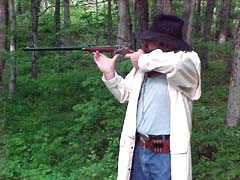
If you yearn for the feel of one of the finest rifles
ever made, the Sharps, you have a choice: you can spend
thousands of dollars and wait for years for a custom-made
rifle, or you can spend hundreds of dollars on a rifle you can
begin to enjoy right now. Jeff's not made of money and he
won't live forever (at least not on this Earth), so the choice
is obvious: Cimarron's "Billy Dixon" 1874 Sharps
.45-90 is a winner!
|
![]()